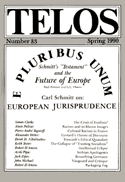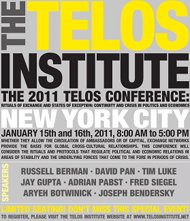This is the third in a series of posts that introduce the thought of historian Martin J. Sklar, as a prelude to a print symposium on his life and work in a future issue of Telos. For a fuller introduction, refer to the head note to the first TELOSscope post. Whereas the first two posts showcased the historian’s engagement with philosophy, this post highlights one of his important contributions to political economy. Sklar profoundly reinterprets the idea of a “mixed economy,” on the basis of the new concepts of “capitalist investment component” (CIC) and “socialist investment component” (SIC). In so doing, he also clarifies the meanings of capitalism and socialism as political-economic systems. Like conventional “mixed economy” theorists, Sklar came to believe that there would be a long historical period during which advanced societies would combine features of capitalism and features of socialism, with the later gaining gradual ascendancy. His understanding of which features belong to which system, however, upends conventional theories of government = socialism, “private” sector = capitalism.
|
It is unlikely that the present EU will ever become politically unified. However a reduced number of member states could constitute a European Federal League designed to become, as such, a new member of the EU in place of the federated states. It could consequently operate separately on a number of issues. Other members might join the new Federal Union later, under certain conditions. It seems that a young internet highflier who calls himself “the Argonaut,” whose idée fixe is the future of the European Union, has become the champion of a possible Federalist European Union and is bombarding the network with a number of miracles that, according to him, are being achieved in Brussels and Strasbourg. He claims that Europe’s political unification is fully realized, that the ECB has extended quantitative easing to all European banks, that the Greek problem, he happily announces, is solved thanks to a giant issue of fifty-year Greek government real estate bonds, which are sending the international financial market agog. The EU Commission, the Argonaut dreams, has decided to support the British suggestion that the EU MPs should work inside various 28 national parliaments, thus integrating the European institutions, and not in Strasbourg; he moreover says that the Frontex Immigrant Agency in Warsaw, duly instructed by Germany, has accepted enthusiastically to coordinate the Mediterranean immigrants distribution among the EU member states who heartedly agree. His most fantastic declaration is that five EU defense ministers of Germany, France, Italy, Spain, and Great Britain, based on articles 28, 42, and 43 of the Lisbon Treaty, have created the EEF, an European Expeditionary Force, which will be based in Sardinia and near Cracow. Special arrangements, he candidly assures the social network, have already been signed with NATO. An earlier version of this essay was presented at the 2011 Telos Conference, “Rituals of Exchange and States of Exception: Continuity and Crisis in Politics and Economics.” “New evangelicals,”[1] perhaps unexpectedly for non-believers, offer a few ideas—interesting for their mix of market and common-good positions, and for an apparent paradox. “New evangelicals” work with a sophisticated notion of the common good—though their beliefs and practices rely on the very eighteenth-century principles that fostered unregulated market development. That is, they uphold unencumbered entrepreneurialism in markets, but this commitment makes them entrepreneurs for the benefit of others. This becomes more interesting when one considers that the “new evangelical” paradox has significant effect on the circulation of money and people worldwide. The material here is taken from field research that I did between 2005 and 2010 and which will appear in a book later in 2011 (Eerdmans Publishing). |
||||
|
Telos Press Publishing · PO Box 811 · Candor, NY 13743 · Phone: 212-228-6479 Privacy Policy · Data Protection Copyright © 2025 Telos Press Publishing · All Rights Reserved |
||||
 Simon Clarke’s “The Crisis of Fordism or the Crisis of Social Democracy?” deals with the need to develop different economic strategies as the interventionist welfare state underwent many challenges and crises in the 1980s. The crumbling of communism further supported the idea that weak state interventionism often could not reach its stipulated economic goals. In comparison to the socialist critique of the state, the political right put forward measures and tools such as privatization to support its critique of the state by the following means: first, by focusing on the selective redistribution of income; and second, by bringing about a particular kind of Keynesian economic policy featuring military characteristics (73). The economic growth came to an end in 1987 when a global panic about the massive credit boom begun under Reagan and Thatcher broke wide open. Still, the right’s policies reached a new height with the waves of radical liberalization in the former communist countries as well as in the Third World. Clarke, however, expresses severe doubts about this strategy being the solution to neoliberalism’s economic strategy crisis (79).
Simon Clarke’s “The Crisis of Fordism or the Crisis of Social Democracy?” deals with the need to develop different economic strategies as the interventionist welfare state underwent many challenges and crises in the 1980s. The crumbling of communism further supported the idea that weak state interventionism often could not reach its stipulated economic goals. In comparison to the socialist critique of the state, the political right put forward measures and tools such as privatization to support its critique of the state by the following means: first, by focusing on the selective redistribution of income; and second, by bringing about a particular kind of Keynesian economic policy featuring military characteristics (73). The economic growth came to an end in 1987 when a global panic about the massive credit boom begun under Reagan and Thatcher broke wide open. Still, the right’s policies reached a new height with the waves of radical liberalization in the former communist countries as well as in the Third World. Clarke, however, expresses severe doubts about this strategy being the solution to neoliberalism’s economic strategy crisis (79).  In light of the 2008 global financial crisis, a reassessment of the global market system seems to be afoot. If neoliberalism (too much market) yields the Great Recession, if socialist planning (not enough market) produced the failed economies of the former Soviet bloc, and if social-market combinations (too much centralization of the market) progress towards the slow economic growth and high-cost programs of Western Europe, what are better options?
In light of the 2008 global financial crisis, a reassessment of the global market system seems to be afoot. If neoliberalism (too much market) yields the Great Recession, if socialist planning (not enough market) produced the failed economies of the former Soviet bloc, and if social-market combinations (too much centralization of the market) progress towards the slow economic growth and high-cost programs of Western Europe, what are better options? 

